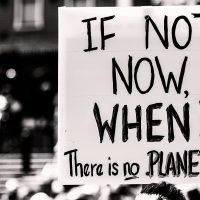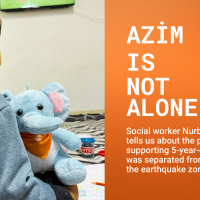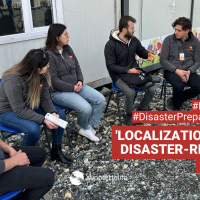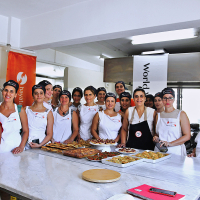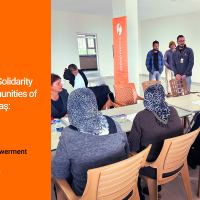Support to Life (STL), organized an event titled ‘Conference of Good Practices on Livelihood Support’ on 13 November 2019 in Radisson Blu Hotel, Şişli. The event is part of a project co-funded by Swiss Agency for Development and Cooperation (SDC), and Save The Children (SCI).
Beginning from the Syrian crisis in 2011, the future of Syrian refugees impacted a vast geography, and became the main focus of regional humanitarian work. Throughout this period, humanitarian services evolved along with evolving needs. Today, short-term emergency needs are giving way to needs requiring durable solutions with long term impact.
A crucial aspect of well-needed solutions concerns helping individuals lead independent, self-reliant lives by means of delivering livelihood support services. These services are made up of both basic skills trainings such as language courses, and a wide range of activities such as entrepreneurship and social skills trainings, mentorship schemes, employee-employer matching activities, cooperative production modalities, etc.
The conference, focusing on these services, hosted 10 ‘good practice examples’ implemented in Turkey. Challenges faced, experiences gained and opportunities created were discussed.
The opening speeches focused on the present situation in Turkey, as well as the prevailing needs and activities being implemented to address them. Migration Expert Burak Yaşar from Directorate General of Migration Management, Harmonization and Communication Department shared statistics on the Syrian population in Turkey and provided an overview of services delivered. United Nations High Commissioner for Refugees, Head of Istanbul Field Office Selen Elif Ay underscored the momentum being built up on livelihood support services. SCI Director of External Relations and Legal Representative to Rurkey, Oben Çoban identified children and youth as key target groups in this context and called upon the humanitarian community to prioritize projects that reinforce hope and self-confidence of individuals. SDC Ankara Humanitarian Office Director Stela Haxhi noted that “the number of people in need of humanitarian assistance is as high as ever higher. This has to be interlinked to development-oriented and peace building activities,” highlighting the need to coordinate humanitarian and development activities. Support to Life Chairperson Gökhan Erkutlu remarked that as development-related services focused on refugees become more visible and known, this will create a snowball effect, leading the path to progress.
 The first session of the conference was focused on entrepreneurship. The keynote speech by Innovation for Development Consulting (I4D) founder Doğan Çelik’s analysis illustrated a transition from aid-focused services to development-focused planning in a comprehensive manner. Çelik noted that as unemployment becomes a dominant issue, supporting entrepreneurship becomes a strategic priority. He also noted that the upcoming term will witness a variety of new actors shaping livelihood support activities – such as the World Bank, international financial organizations, employer confederations, private sector actors and social enterprises.
The first session of the conference was focused on entrepreneurship. The keynote speech by Innovation for Development Consulting (I4D) founder Doğan Çelik’s analysis illustrated a transition from aid-focused services to development-focused planning in a comprehensive manner. Çelik noted that as unemployment becomes a dominant issue, supporting entrepreneurship becomes a strategic priority. He also noted that the upcoming term will witness a variety of new actors shaping livelihood support activities – such as the World Bank, international financial organizations, employer confederations, private sector actors and social enterprises.
The panel section presented 5 good practice examples: IDEMA’s LIFE project, Women to Women Refugee Kitchen by OKDER, RET’s brand Leap Natural, Youth Deal Cooperative’s social cooperative experiences and Tina Zita/Joon collective.
The second session focused on ‘Participation to Labor Market and Employability.’ The session was opened with a keynote by Güler Kaya from Building Markets. Kaya emphasized that when supported with access to relevant expertise, refugees have the capacity to make significant contributions to the economy and she shared a number of examples from Turkey and abroad.
The panel section featured 5 more good practice examples targeting refugee and host communities, focusing on labor market participation and employability. Embark Mentorship project of Gelecek Daha Net, MUDEM’s Worker Support Center, KLKD’s women’s empowerment project, Habitat Association’s Imece project and United Work’s from Refugee to Employee projects were presented.
About the Organizer
Support to Life (STL)
Support to Life is a humanitarian aid organization founded with the aim of helping individuals and communities affected by disasters meet their basic rights and access services. Support to Life responds to disasters by means of working to mitigate risks, strengthening capacities and boosting resilience of most vulnerable segments of society. Support to Life acts in accord with humanitarian aid principles and upholds principles of humanity, neutrality, impartiality, independence and accountability. Support to Life’s main programs are Emergency Response, Refugee Support, Child Protection in Seasonal Agriculture and Capacity Building & Coordination.
About the Donors
Swiss Agency for Development and Cooperation (SDC)
In the Middle East region, Switzerland, through its Swiss Cooperation Programme, contributes to safe, viable and peaceful living conditions for conflict-affected and vulnerable people, reducing fragility, preventing and transforming conflicts.
Switzerland’s contribution in Turkey focuses, among others, in supporting refugees and host communities, as well as in assisting public institutions in building their migration management capacities, in line with the priorities set by national authorities and the UN in 3RP, international law and human rights standards.
Save the Children International (SCI)
As Save the Children, we believe that every child should have a future. Each new day, we work for each of the children to make a healthy start to life in the world and Turkey, to access education with equal opportunities and strive to be protected from any victimization. After disasters and crises, and when children are most vulnerable, Save the Children is one of the first institutions to arrive and leave the region last. We have adopted the principle that all needs of children should be met, and their voices should be heard by the whole world. Our goal is to provide permanent solutions for millions of children worldwide, including those in the most difficult-to-reach areas, to meet their needs. As the Save the Children family, we aim to evolve children’s lives into a beautiful future.
German Federal Ministry for Economic Cooperations and Development (BMZ)
The German Federal Ministry of Economic Cooperation and Development is a German public donor for transitional and long-term development programmes. BMZ is funding projects in 69 partner countries following the guiding principles of Germany's development cooperation of protecting human rights and fostering the partner countries' sense of ownership and ability to help themselves. In Turkey, BMZ is supporting the country´s work on tackling the challenges posed by displacement.
Thank you for reading the article and for coming this far. Now you can support life while you are here.



